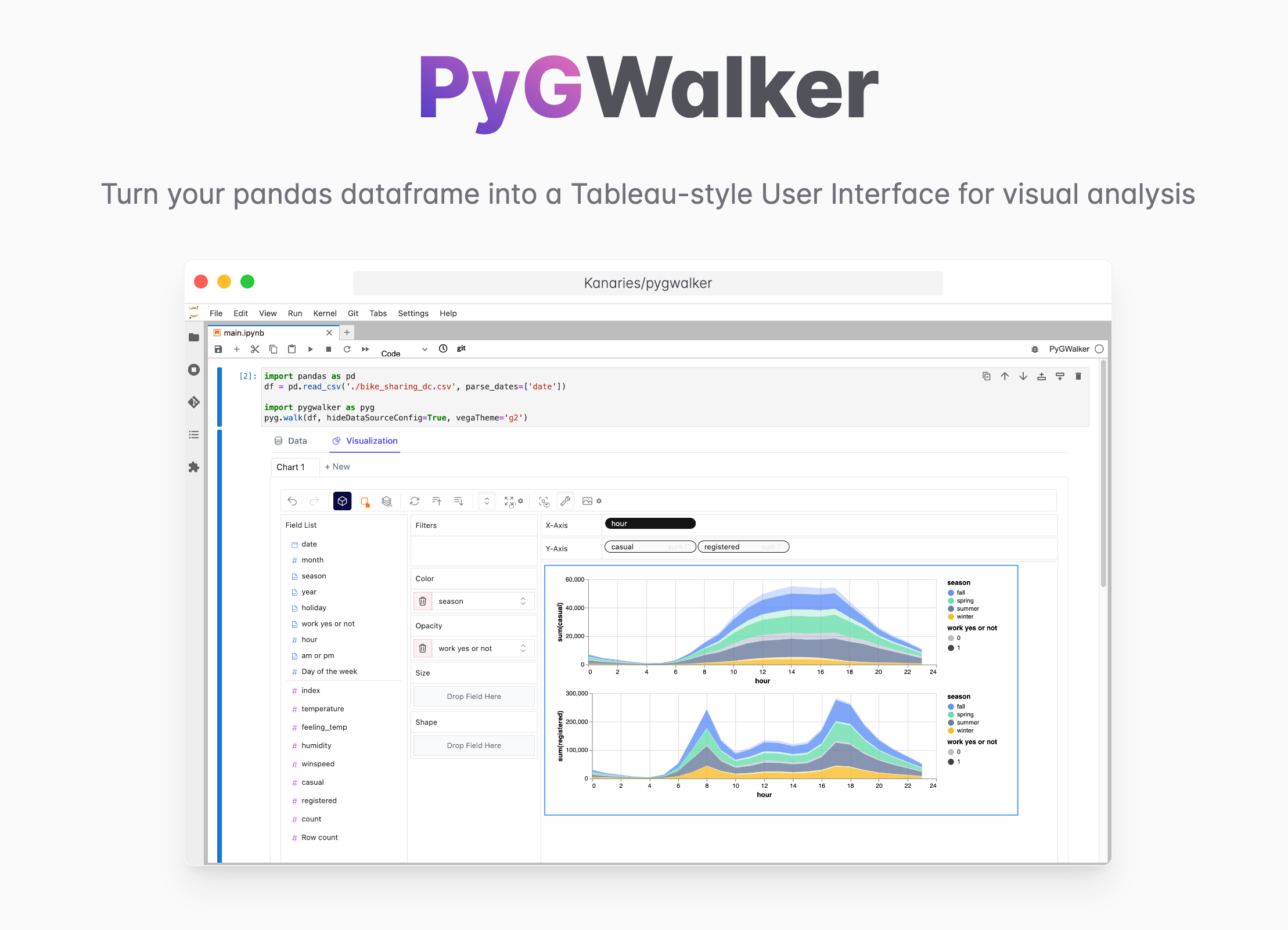Python Make Beautiful Soup Faster: Improve Your Web Scraping Efficiencies Now!
Published on
Web scraping is a powerful tool in the data scientist's arsenal. It allows us to extract and manipulate data from the web, enabling a wide range of applications. One of the most popular libraries for web scraping in Python is Beautiful Soup. However, as with any tool, there can be performance issues. In this article, we'll explore how to make Beautiful Soup faster, improving your web scraping efficiencies.
Beautiful Soup is a Python library that is used for web scraping purposes to pull the data out of HTML and XML files. It creates a parse tree from page source code that can be used to extract data in a hierarchical and more readable manner. But sometimes, Beautiful Soup can be slow. This can be a problem when dealing with large amounts of data or when running complex web scraping operations.
Want to quickly create Data Visualization from Python Pandas Dataframe with No code?
PyGWalker is a Python library for Exploratory Data Analysis with Visualization. PyGWalker (opens in a new tab) can simplify your Jupyter Notebook data analysis and data visualization workflow, by turning your pandas dataframe (and polars dataframe) into a Tableau-style User Interface for visual exploration.
Make Beautiful Soup Faster by Using Different Parsers
One of the ways to speed up Beautiful Soup is to use a different parser. Beautiful Soup supports several parsers, but the most common ones are the Python's built-in HTML parser and lxml. According to the first source, using lxml can make Beautiful Soup parsing 10 times faster. This is because lxml is written in C and can therefore run more operations per second than Python. To use lxml with Beautiful Soup, you simply need to install it (using pip install lxml) and then specify it when creating the Beautiful Soup object:
from bs4 import BeautifulSoup
soup = BeautifulSoup(html_content, 'lxml')Make Beautiful Soup Faster with Caching Libraries
Caching is a technique used to store data in a temporary storage area, also known as cache, so that it can be accessed faster in the future. When it comes to web scraping, caching can significantly improve the performance of BeautifulSoup.
One of the most popular caching libraries in Python is requests-cache. It provides a transparent caching layer for requests. Here is an example of how to use it with BeautifulSoup:
import requests
import requests_cache
from bs4 import BeautifulSoup
# Create a cache that lasts for 24 hours
requests_cache.install_cache('my_cache', expire_after=86400)
# Now use requests as you normally would
url = "http://example.com"
response = requests.get(url)
soup = BeautifulSoup(response.text, 'lxml')In this example, the first time you run the script, requests-cache will store the result in 'my_cache'. If you run the script again within 24 hours, requests-cache will use the cached result, making the script run faster.
Make Beautiful Soup Faster with CDN and Proxy Servers
A Content Delivery Network (CDN) is a geographically distributed network of proxy servers and their data centers. The goal is to provide high availability and performance by distributing the service spatially relative to end-users. When it comes to BeautifulSoup, a CDN can help improve performance by reducing the latency of the requests.
A proxy server is a server that acts as an intermediary for requests from clients seeking resources from other servers. When used with BeautifulSoup, a proxy server can help improve performance by balancing the load of the requests.
Here is an example of how to use a proxy server with BeautifulSoup:
import requests
from bs4 import BeautifulSoup
proxies = {
'http': 'http://10.10.1.10:3128',
'https': 'http://10.10.1.10:1080',
}
url = "http://example.com"
response = requests.get(url, proxies=proxies)
soup = BeautifulSoup(response.text, 'lxml')In this example, the requests are sent through the proxy server specified in the proxies dictionary. This can help balance the load of the requests and improve the performance of BeautifulSoup.
Optimizing BeautifulSoup with Multithreading
Multithreading is a technique that allows a single set of code to be used by several processors at different stages of execution. This can significantly improve the performance of your BeautifulSoup operations, especially when dealing with large amounts of data or when running complex web scraping operations.
In Python, you can use the concurrent.futures module to create a pool of threads, each of which can run a separate instance of your BeautifulSoup operation. Here's an example:
import requests
from bs4 import BeautifulSoup
from concurrent.futures import ThreadPoolExecutor
def fetch_url(url):
response = requests.get(url)
return response.text
def parse_html(html):
soup = BeautifulSoup(html, 'lxml')
# perform your BeautifulSoup operations here
urls = ["http://example.com/page1", "http://example.com/page2", "http://example.com/page3"]
with ThreadPoolExecutor(max_workers=5) as executor:
htmls = executor.map(fetch_url, urls)
for html in htmls:
parse_html(html)In this example, the ThreadPoolExecutor creates a pool of 5 threads. The map function then applies the fetch_url function to each URL in the urls list, distributing the work among the threads in the pool. This allows multiple URLs to be fetched and parsed at the same time, speeding up the overall operation.
FAQs
1. What are the different parsers supported by Beautiful Soup?
Beautiful Soup supports a variety of parsers, the most common ones being 'html.parser', 'lxml', 'xml', and 'html5lib'. The 'lxml' parser is known for its speed and efficiency, while 'html5lib' parses HTML the way a web browser does.
2. How can I make Beautiful Soup faster?
There are several ways to make Beautiful Soup faster. One way is by using a faster parser like 'lxml'. Another way is by using a caching library like 'requests-cache' to cache the results of the requests. You can also use a CDN or a proxy server to reduce the latency of the requests.
3. Does using a caching library actually improve performance?
Yes, using a caching library can significantly improve the performance of BeautifulSoup. A caching library like 'requests-cache' can store the results of the requests in a cache, so that they can be accessed faster in the future.
